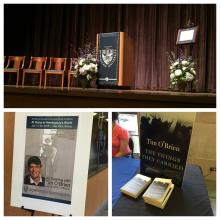Hemingway Review Blog
The Hemingway Review blog shares information on topics relevant to Hemingway, his writings, and the study of his work. It’s a more casual, less serious space for playful pieces and personal reflections. We will consider videos, audio recordings, slide presentations, photographs, and short pieces of writing (generally 250-500 words). Reflections on teaching and discussions of popular culture are welcome. Please review the blog's submission guidelines and contact Lisa Tyler, blog editor, at hemingwayreviewblog@gmail.com if you are interested in contributing to the blog.
Wayne Catan interviews Brigid Pasulka, 2010 PEN/Hemingway Award winner for A Long, Long Time Ago and Essentially True.
Ron Berman tackles Hemingway's France in this eighth installment of Books in the Background.
In this latest installment, Wayne Catan interviews Jane Hamilton, 1989 PEN/Hemingway Award Winner for The Book of Ruth.
News coordinator, Michael Von Cannon, interviews Justin Rice from Lit Charts about "What Makes Hemingway Hemingway?"
The University of Idaho celebrated its 8th annual Hemingway Festival.
Wayne Catan interviews 2013 PEN/Hemingway Award Winner Kevin Powers.
Ron Berman's latest post in his Books in the Background series tackles Hemingway's Europe.
Interview with Michael Dahlie, 2009 PEN/Hemingway Award Winner for A Gentleman's Guide to Graceful Living
In this new series of articles exclusive to The Hemingway Review Blog, Hemingway scholars will interview PEN/Hemingway Award winners to commemorate the 40th Anniversary of the award.
The Fall 2016 issue of The Hemingway Review has been published. This issue begins with a remarkable front cover, featuring an image from a booklet entitled “Don Ernesto en Pamplona” by Waldo Peirce. The painter drafted this booklet after his memorable trip to Pamplona with Hemingway in 1927.
Tribute to John Edmonds Sanford
Social histories of the twenties often account for opinions by referring to the response of groups to headline events. Many of these histories use familiar rubrics: the boom, the consumerism it induced, the moral and stylistic changes affecting different generations. The "Introduction to the Volume" of The Introduction concludes that Hemingway's letters and fiction are reliable evidence for the cost, nature, and value of things he observed.
Michael Reynolds wrote in The Young Hemingway (1986) that “not long after the movie of Roosevelt's African hunt played Oak Park, the Hemingway family-reunion picture shows young Ernest in his safari costume standing at the edge of the smilers. At his side he holds a hat like the one Teddy wore. In National Geographic, he devoured Roosevelt's account of the hunt, complete with pictures of dead animals and half-naked native women. Roosevelt's book African Game Trails became a permanent part of Hemingway's library.”
Thomas Bevilacqua brings his series to a close with toasts and trivia!
Our Man in Oak Park reboots mid-conference.
Tom talks about our evening with Tim O'Brien.
Celebrating Susan Beegel's editorship and the PEN Hemingway on board the Odyssey.
